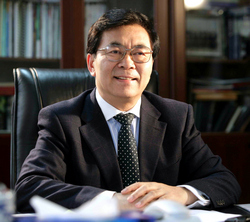Bai Chunli


Professor Bai Chunli, MCAS
Doctor of Science, honoris causa (2014)
Professor Bai Chunli is a renowned scholar well-respected both in the nation and around the globe. He is currently President of the Chinese Academy of Sciences (CAS) and The World Academy of Sciences, and Honorary President of the University of Chinese Academy of Sciences.
Professor Bai was born in 1953 in Dandong of Liaoning Province. He completed his undergraduate studies at Peking University and obtained his master’s and doctoral degrees at the Institute of Chemistry of CAS. In 1985, Professor Bai worked as a post-doctoral associate at the prestigious Jet Propulsion Laboratory at the California Institute of Technology of the US, the first Chinese scientist to work there since 1950.
Professor Bai is the first Chinese scientist to actively engage in research in nanotechnology, and one of the pioneers in the field of scanning tunnelling microscopy. Under Professor Bai’s leadership and coordination, his research team successfully developed the first computer-controlled scanning tunnelling microscope (STM) operating at ambient condition, the first low-temperature STM, the first ultrahigh vacuum-STM, the first laser atomic force microscopy and the first ballistic electron emission microscopy in China. Up until today, Professor Bai has authored 12 monographs and boasts more than 350 scientific publications in refereed journals. He also owns over 10 patents of his inventions and applications and is serving as editor-in- chief on editorial boards of dozens of scholarly journals. Professor Bai is also the Founding Director of the National Centre for Nanoscience and Technology and Chief Scientist of the National Steering Committee for Nanoscience and Technology.
Professor Bai enjoys global prestige as an eminent scientist. He is Member of CAS and Fellow of The World Academy of Sciences, Elite Foreign Associate of the National Academy of Sciences of the US, Foreign Member of the Royal Society of the UK, Honorary Fellow of the Royal Society of Chemistry of the UK, Foreign Member of the Russian Academy of Sciences, Member of the German Academy of Sciences and Engineering, Member of the Royal Danish Academy of Sciences and Letters, Honorary Fellow of the Indian Academy of Sciences; he was also conferred honorary doctorates by University of York of the UK, University of Minnesota of the US, Lund University of Sweden, Roskilde University of Denmark, and The University of Queensland of Australia. In 2001, he was conferred International Medal by Society of Chemical Industry of the UK; in 2010 he was awarded “Medal of Contributions to Development of Nanoscience and Nanotechnology” by the United Nations Educational, Scientific and Cultural Organisation, the first Chinese scientist to be conferred this honour.
Professor Bai is equally renowned for his visionary leadership in the sciences. He was Vice President of the All-China Youth Federation, President of the Chinese Chemical Society, Vice President of the China Association for Science and Technology, Honorary Chairman of Chinese Society of Micro-Nano Technology and Director of the National Centre for Nanoscience and Technology. His vision has helped realise the introduction of the “Hundred Talents Programme” and the “Thousand Talents Programme”, which invited top-ranking experts in science and technology worldwide to collaborate with China’s scientists in research. He also launched the “3H’s Programme” (Home, House and Health) to secure the accommodation and healthcare needs of overseas scientists and their families.
CAS and HKBU have maintained a close partnership for over a decade. In 2002, under Professor Bai’s advocacy, the Joint Institute of Environmental Sciences of HKBU and Research Centre for Eco-Environmental Sciences of CAS was established. In 2013, the Research Centre for Eco-Environmental Sciences of CAS collaborated with HKBU to establish at the University the Partner State Key Laboratory of Environmental and Biological Analysis (HKBU). By integrating the strengths of biological science, environmental science and material science, this collaboration serves to foster quality development in the testing of persistent toxic pollutants and food safety in Hong Kong as well as in Mainland China, and provides an optimum platform for joint cultivation of doctoral students.
Professor Bai is a scientist of exemplary vision and leadership. He has contributed to remarkable achievements in nanoscience and has fostered the nation’s advancement in science and technology. He is equally supportive of the various initiatives of the University.